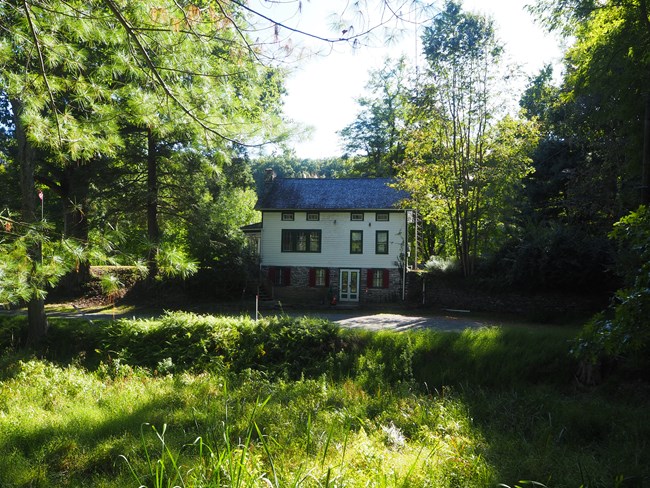
National Park Service Initially, the property was owned by Benjamin Quick, a farmer, who purchased about 25 acres of the land around the year 1808. During this time, the area was sparsely populated given its general incompatibility with farming and location on the then unnavigable Delaware River. When construction began on the canal in 1825, many engineers explicitly noted the scarcity of people in the area, recalling being able to remember every resident by name. Benjamin lived here with his son, David Quick, until his death in a small, dwelling with a barn. David would pass shortly thereafter in 1835, about six years after the Delaware and Hudson Canal was completed in 1829. 
National Park Service Here, Cowen maintained a farm in order to stock a small storefront that was constructed on the towpath to sell to those traveling along the Delaware and Hudson Canal as well as the local community. The farm primarily grew potatoes, buckwheat, and hay, which provided a small surplus for his market, sustenance for his family, and feed for a small amount of livestock. Fruits such as raspberries, blackberries, and strawberries were also sold.
Given the relatively small size of the property, about 25 acres, Cowen Farm’s yield is a testament to the savvy land-management practices of those who lived along the canal. The land itself is also considered traditionally undesirable for farming considering its rocky terrain. However, many in the region, like Cowen, discovered ways to utilize it. The property is also a testament to the widespread private economic growth that occurred in the region as a result of the success of the Delaware and Hudson Canal. The farmstead is constructed upon a garden terrace formed from leftover soil that was moved during the construction of the canal. Most of the surrounding landscape along the Delaware River had previously featured steep cliffs with rocky outcrops and poor soil. However, the large piles of soft soil that came from canal construction made for excellent agricultural soil. After the Delaware and Hudson Canal closed in 1898, small local farms were unable to survive and new economies like tourism gradually took over in the region as residents from urban areas like New York City were encouraged to purchase land cheaply and vacation in the Delaware Valley. Cowen Farm left the Cowen family after the death of Joseph’s daughter and son-in-law, Caroline and Albert Stage in 1915 and was later sold as a vacation home. It was purchased by the National Park Service in 1995 for its historic integrity and suitability for interpretation. On the banks of the Delaware and Hudson Canal, Cowen Farm was positioned among a deeply interconnected community of lock tenders, farmers, lumbermen, tanners, and homemakers. Today, visitors who explore the grounds of Cowen Farm can imagine canal boats floating by, crops being tended to, and Cowen’s storefront bustling. The property, situated on an intact and undeveloped portion of the canal, offers an unmatched glimpse into 19th century American life on the Delaware River. |
Last updated: August 23, 2021
